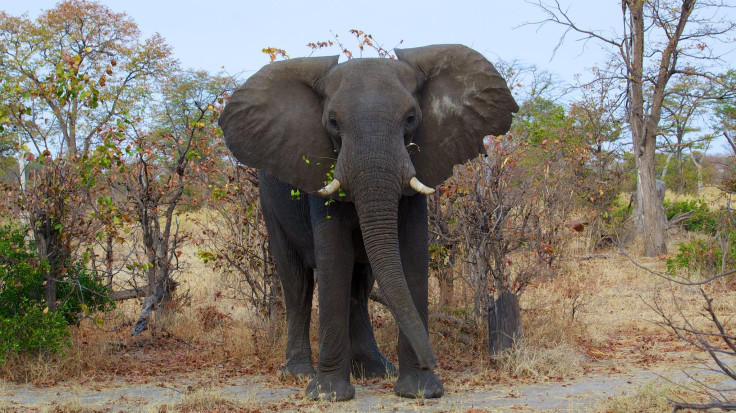Botswana Auctions Off Rights To Shoot Elephants To Foreign Trophy Hunters

KEY POINTS
- Botswana had a five-year ban on elephant hunting from 2014-2019
- Proponents of the hunt say there are too many elephants and they destroy crops
- Botswana has about 130,000 elephants
The southern African nation of Botswana has auctioned off the rights for trophy hunters to shoot 60 elephants for up to $43,000 per animal – the first such measure since it removed a ban on hunting last year.
"Seven hunting packages, of 10 elephants each, were available for auction. Only one [package] was not sold as no bidders met the reserve price of [$181,000]," said Adrian Rass, managing director of Auction It, the local firm that conducted the auction. "The six [packages] were sold for a total price of [$2.3 million]."
Most trophy hunters come from the U.S., and Botswana will permit foreign hunters to shoot up to 202 elephants [out of a total quota of 272] for the whole year.
The 2020 hunting season will commence in April.
Botswana has about 130,000 elephants, making it the world’s biggest population of the mammals.
Last May, President Mokgweetsi Masisi lifted the elephant hunting ban, reversing the policy of his predecessor Ian Khama. The prior ban had been in place for five years,
Masisi explained that the ban was lifted in order to “conserve Botswana’s natural resources… to facilitate human-wildlife co-existence and… to promote the scientific management of the country’s elephants and other wildlife species.”
Masisi noted that Botswana’s elephant population has been “exploding” – from about 50,000 in 1991 to more than 130,000 now – “far more than Botswana’s fragile environment, already stressed by drought and other effects of climate change, can safely accommodate.”
Masisi noted that as elephants have moved out of their usual feeding zones to search of food and water, there has been “a sharp increase in the number of dangerous human-elephant interactions, one result of which has been widespread destruction of crops, livestock and property. In the north, marauding elephants have slashed maize yields by three-quarters.”
Indeed, farmers have complained of how elephants have destroyed crops and trampled some villagers to death.
"Elephants have killed a lot of people and destroyed livelihoods. I think [thr] government is doing the right thing in reducing their numbers," said Tiro Segosebe, a local villager.
But many conservationists around the world are outraged by the auction.
Audrey Delsink, Africa's wildlife director for Humane Society International said: "The Botswanan elephant hunting auctions are deeply concerning and questionable. Hunting is not an effective long-term human-elephant mitigation tool or population control method.”
"Shame on you President Masisi, we will not forget," human and animal rights group EMS Foundation tweeted.
Neil Fitt, the head of the Kalahari Conservation Society in Botswana, said hunting should be practiced "ethically and properly.”
Rosemary Alles, cofounder and president of the Global March for Elephants and Rhinos, said: “studies have shown that local communities do not reap the benefits that they are promised from the hunting industry. Killing… elephants in Botswana will not control elephant numbers, it will not reduce human-elephant conflict and will not create jobs in areas where opportunities are scarce. Appropriate land-use planning including dedicated migratory corridors will aid elephant dispersal and increase the probability of amicable human elephant coexistence."
Former President Khama also criticized his successor.
"I have been against hunting because it represents a mentality [of] those who support it, to exploit nature for self-interest that has brought about the extinction of many species worldwide," he said.
Africa’s overall elephant population has plunged from 1.3 million in 1979 to 415,000 in 2015, partly due to illegal poaching.
Now some environmentalists worry that licensed hunting might stimulate demand for body parts and encourage more illegal poaching.
“Scientists have noticed that trophy hunting and poaching of African elephants is leading to elephants having shorter tusks and that there are now more adult elephants with no tusks,” said Eduardo Goncalves, founder of the Campaign to Ban Trophy Hunting. “Trophy hunting is artificial selection. By targeting the biggest and strongest animals, it leaves the weaker, smaller animals behind. This means the best genes are being lost, so the species will be less able to adapt to accelerating climate change, it will be more prone to disease, and the risk of extinction is greater.”
Explorer Sir Ranulph Fiennes wrote a letter to Masisi where he said: “Trophy-hunting of elephants often brings a slow, painful death. With its population dwindling and increasingly scattered, the impact of trophy-hunting could be disastrous and possibly contribute to the extinction of the species. This would be a major global conservation disaster – potentially the worst in living memory – and have tremendously damaging consequences for efforts to conserve endangered fauna and flora everywhere.”
© Copyright IBTimes 2024. All rights reserved.




















